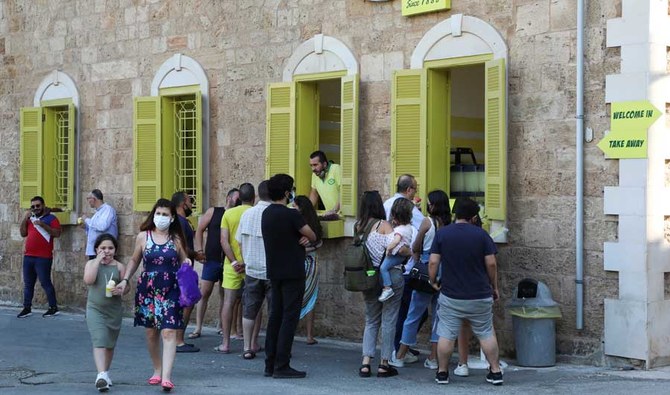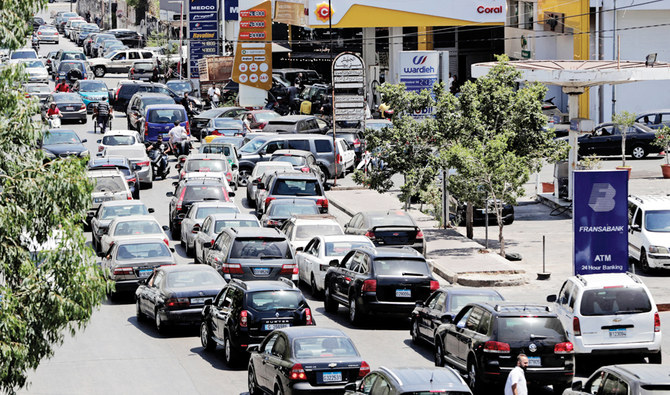
By Najia Houssari -- arabnews.com -- BEIRUT: Violence has seeped into daily Lebanese life due to the country’s severe economic crisis and a breakdown in official security, with fights and even shootings at gas stations. Lebanon is experiencing an economic crisis that is likely to rank as one of the world’s three worst in more than 150 years, according to the World Bank. There are shortages of essential items such as fuel and medicine, while bread has become more expensive after the Syndicate of Bakery Owners raised prices now that government subsidies on sugar and yeast have ended. People are queuing for hours at gas stations, and fistfights turn into shootings as people clash over who gets to fill their tank first. People are taking their own lives or destroying their sources of income in desperation.
A 25-year-old man named Mathew "found dead" (currently under investigation) in his apartment in the Keserwan area, while a man in Baalbek tried to commit suicide in his shop because of the debts he had accumulated. Another person set fire to his bean cart in a Beirut street after receiving an order to remove it. The cart was his sole livelihood. Living conditions have deteriorated considerably amid a political deadlock over the formation of a new government. There is a dispute between Prime Minister-designate Saad Hariri and President Michel Aoun about who should be in the new administration and what roles they should have, among other issues. Hariri was named to form a new government last October but has yet to succeed. The government of Prime Minister Hassan Diab resigned days after a massive blast in Beirut on Aug. 4 that killed more than 200 people and injured thousands. One activist turned his aim at the country’s authorities, tweeting: “You have turned Lebanon into a jungle and put people at the mercy of thugs at gas stations. You have humiliated people in every detail of their lives. We place the scenes of shootings at gas stations in God’s hands because we have no one in Lebanon to complain to. They are all responsible without exception.”
*وكان إنتخاب العماد ميشال سليمان تاريخاً مفصلياً بين حقبة الإحتلال والتحرّر، وتميّز عهده بالبحبوحة وتدفقت الأموال الخليجية إلى لبنان قبل أن ينقلب …

by Doreen Abi Raad | Catholic News Service -- Pope Francis' meeting with Lebanon's Christian religious leaders will "at least give a sign of hope" to the beleaguered country, said the Vatican nuncio to Lebanon. "The situation is becoming more dramatic," Archbishop Joseph Spiteri, the nuncio, or papal ambassador to Lebanon, told Catholic News Service in mid-June. The July 1 summit at the Vatican will gather Lebanon's Catholic, Orthodox and Protestant church leaders for "a day of reflection on the troubling situation in the country and to pray together for the gift of peace and stability," Pope Francis said in announcing the summit. Pope Francis repeatedly has expressed his concern about Lebanon, particularly since the August 2020 Beirut port blasts. The nuncio said Pope Francis is "extremely sensitive" to the "mosaic makeup of Lebanon," which has "always been a meeting place of different communities, different cultures, religiously affiliated groups." About 35% of Lebanese citizens are Christian.
The nuncio stressed that, in Lebanon, "there is real religious freedom and freedom of expression, and at the same time sharing of responsibility." The Lebanese system reserves the presidential office to a Maronite Christian, the prime minister to a Sunni Muslim and the speaker of the house to a Shiite Muslim. Archbishop Spiteri pointed out that St. John Paul II had said: "Lebanon is more than a country. It is a message of freedom and an example of pluralism for East and West." Currently, however, Lebanon is crumbling under a multitude of socioeconomic, financial and political crises. Its currency has lost 90% of its value in the past 20 months. The economic crisis -- labeled by the World Bank as one of the world's worst since the 1850s -- has pushed more than half the population into poverty. The country has been without a fully functioning government for 10 months, since officials stepped down after the Beirut port explosion. Political leaders have failed to agree on a new Cabinet needed to implement reforms required to unlock desperately needed foreign aid. Reserves of the central bank have reached a critical threshold, causing fuel, electricity and medicine shortages.

By NAJIA HOUSSARI - arabnews.com -- BEIRUT: Demonstrators blocked a highway connecting Lebanon and Syria on Monday with burned tires and metal bars, protesting a decision aimed at curbing smuggling into Syria. Gasoline smugglers blocked the Masnaa crossing after security forces moved to prevent them from driving through the legitimate crossing. Amid worsening living conditions in Lebanon, some are filling up their cars with goods and fuel and traveling into Syria through the Masnaa crossing to sell them on the other side at double the price. “The process involves paying bribes to pass into Syrian territory, so when the Lebanese side decided to prevent smuggling, the smugglers protested,” said a security source. Customs authorities in Lebanon’s eastern Bekaa region announced they will strictly enforce permit requirements for vehicles going into Syria to limit fuel smuggling. Protesters on the international highway demanded the process be applied to everyone crossing into Syria or be scrapped.
The Lebanese are still queuing for hours at gas stations to get subsidized gasoline, with a 20-liter canister of gasoline being sold for 44,000 Lebanese pounds ($29). On the black market, the price is between 70,000 to 100,000 Lebanese pounds. The shocking costs have led to citizens waiting at gas stations getting into fights. One person was wounded from a fistfight that turned into a shooting in front of a station in Tripoli on Monday. The minister of energy in the caretaker government, Raymond Ghajar, said a few days ago: “The real price of a canister is about 200,000 Lebanese pounds, while the Lebanese now pay about 40,000 Lebanese pounds.” His remarks came amid indications that the substance will no longer be subsidized “at a certain point.”
Khazen History


Historical Feature:
Churches and Monasteries of the Khazen family

St. Anthony of Padua Church in Ballouneh
Mar Abda Church in Bakaatit Kanaan
Saint Michael Church in Bkaatouta
Saint Therese Church in Qolayaat
Saint Simeon Stylites (مار سمعان العامودي) Church In Ajaltoun
Virgin Mary Church (سيدة المعونات) in Sheilé
Assumption of Mary Church in Ballouneh
1 - The sword of the Maronite Prince
2 - LES KHAZEN CONSULS DE FRANCE
3 - LES MARONITES & LES KHAZEN
4 - LES MAAN & LES KHAZEN
5 - ORIGINE DE LA FAMILLE
Population Movements to Keserwan - The Khazens and The Maans
ما جاء عن الثورة في المقاطعة الكسروانية
ثورة أهالي كسروان على المشايخ الخوازنة وأسبابها
Origins of the "Prince of Maronite" Title
Growing diversity: the Khazin sheiks and the clergy in the first decades of the 18th century
Historical Members:
Barbar Beik El Khazen [English]
Patriach Toubia Kaiss El Khazen(Biography & Life Part1 Part2) (Arabic)
Patriach Youssef Dargham El Khazen (Cont'd)
Cheikh Bishara Jafal El Khazen
Patriarch Youssef Raji El Khazen
The Martyrs Cheikh Philippe & Cheikh Farid El Khazen
Cheikh Nawfal El Khazen (Consul De France)
Cheikh Hossun El Khazen (Consul De France)
Cheikh Abou-Nawfal El Khazen (Consul De France)
Cheikh Francis Abee Nader & his son Yousef
Cheikh Abou-Kanso El Khazen (Consul De France)
Cheikh Abou Nader El Khazen
Cheikh Chafic El Khazen
Cheikh Keserwan El Khazen
Cheikh Serhal El Khazen [English]
Cheikh Rafiq El Khazen [English]
Cheikh Hanna El Khazen
Cheikha Arzi El Khazen
Marie El Khazen